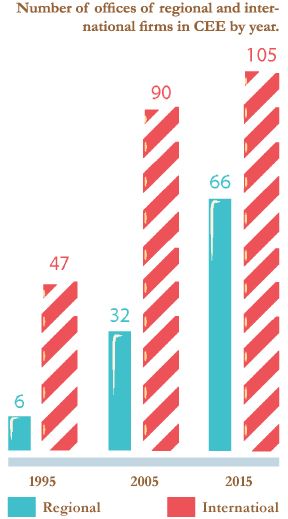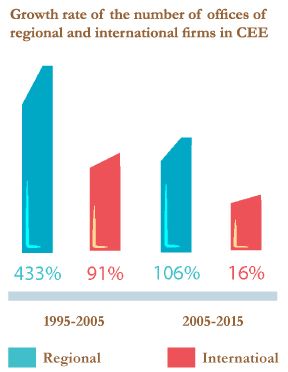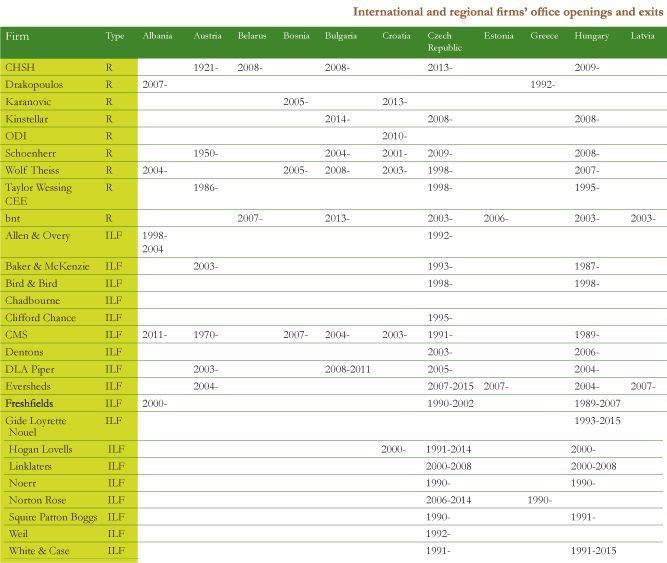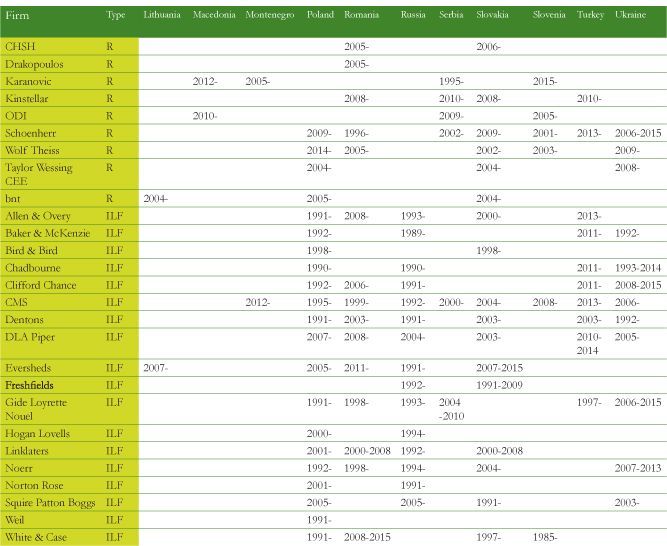The Buzz is a short summary of the major and relevant topics of interest in Central and Eastern Europe, provided by those best positioned to know: law firm partners and legal journalists/commentators on the ground in each CEE country.
Austria
“Intense movement in the banking sector, with others likely to follow”
A lot of movement in the banking sector was reported by Willibald Plesser, Partner and Co-Head for CEE/CIS at Freshfields. According to Plesser, the topic of HETA remains very hot. Despite the fact that matters between BayernLB [which Freshfields represented in the dispute] and HETA (former Hypo Alpe Adria), “have reached a partial settlement, there are still many creditors out there trying to get their money from HETA or the State of Carinthia. This has set off a wave of instructions of both Austrian and foreign law firms. A number of law suits have already been filed against HETA and Carinthia, including a large number of claims against HETA before the courts of Frankfurt.”
The banking sector is looking at other potential moves, as UniCredit has announced a substantial restructuring of its operations in Austria, with its CEE business likely to be transferred to Milan. At the same time, there are rumors that Raiffeisen was planning to change its structure (in particular, a potential merger of so-called “sector banks” was reported), while in Poland the exit of Raiffeisen seems to be on hold due to regulatory requirements. Erste is selling off NPL portfolios, and the owners of BAWAG seem to be looking for a potential exit – although Plesser noted how difficult it was to sell a bank in the region these days. The general feeling seems to be that the Austrian market is, at the moment, highly competitive and over-banked, and some of the moves above would reflect the difficulty resulting from that.
Aside from banking, compliance issues “are all over the place” with the Volkswagen case being just one of the ongoing issues in a practice area which is rapidly growing these days.
Plesser pointed to other promising practice areas. The first was Disputes, where a number of arbitrations have already popped up, and others are likely to follow, all revolving around breaches of investment treaties by states. Some of these disputes result from recent pieces of legislation on fixed-rate conversions of Swiss franc loans (such as in Hungary, Croatia, or potentially Poland). The second potentially growing practice is Private Equity. Plesser explained that there is “substantial ongoing activity in the market,” not only from the classic investment funds that have been active in the region for a long time but also from pension funds (e.g., Canadian or Australian funds) who are looking around the region for long term investments in the infrastructure sector.
Bosnia and Herzegovina
“Legal updates abound, complemented by several big projects keeping the market on its toes”
Bosnia and Herzegovina’s legislators have had a fruitful period, according to Emina Saracevic, Partner at SGL – Saracevic & Gazibegovic Lawyers, with several notable legal updates being passed recently.
Specifically, a new labor code entered into force at the end of August with a lot of work pending to harmonize it with internal acts of companies (such as rulebooks and employment agreements where applicable), all to be completed by February 2016. According to Saracevic, the main goal of the new piece of legislation is to “abolish unfounded employee benefits that primarily existed in the public sector, and create a positive environment in the private sector with the market dictating employment terms and conditions rather than number of post-communist relicts that were complicating business and employment in general.”
A new law on companies was published in December and is due to come into force on December 22, 2015, closely following the new law on foreigners which came into force on November 25. This law introduced a blue card framework, and many of the legal updates reflect an overall drive to harmonize national legislation with EU legislation, according to Saracevic.
On the business side, several power plant developments are keeping the market excited, with the Government seeking to set up several strategic partnerships in 2016. The top bids at the moment, for a total project value of EUR 1 billion, are coming from Chinese companies.
At the same time, several infrastructure projects are developing quickly, both in terms of highways and railways, and that will likely continue to keep the market busy into the first half of 2016.
Estonia
“Regulatory work heating up”
Against the background of the Big 4 law firms entering the legal services market at both local and international levels, “news items number 1 and 2 in terms of what is most discussed in the legal market in Estonia is the merger between Cobalt and Borenius,” according to Risto Agur, Managing Partner of KPMG Legal Estonia. The main question is whether the teams “will be able to make the merger work, as 1+1 might not always make 3, or even 2, in a small market like Estonia,” explained the KPMG Partner. “Making synergies work is always the tricky part in such mergers so the market is now looking at it to see how it will play out,” he concluded.
In terms of what’s actually keeping lawyers busy in the country, Agur said that “while there does not seem to be a lot of M&A work going on in Estonia, regulatory, and in particular financial regulatory work is picking up considerably.” Agur explained that much of that work is coming from EU-driven regulations with financial institutions, in particular, “struggling to meet the new regulations that are coming into play (e.g., the Fourth AML Directive, MiFID2, etc.) which keeps lawyers rather busy.” Aside from banks, Agur pointed to 30 or 40 entrepreneurs in the lending market in Estonia that are “going through extensive preparations to meet new requirements arising from the Creditors and Credit Intermediaries Act that, in broad terms, resemble regulations on banks despite them only operating as lending businesses (and not raising deposits from the public like banks).” Despite the flow of regulations, Agur reported that the market is seeing a number of new potential financial institutions looking to set up in Estonia.
Latvia
“Tax and a bit of politics to talk about in Latvia”
According to Eva Berlaus, Office Managing Partner of Sorainen in Latvia, Tax is the buzzing topic in Latvia. “Our Government is adopting the budget for next year and it is coming up with creative solutions to increase tax revenue,” Berlaus commented, while explaining that the regulators have set themselves an interesting challenge within the ongoing tax overhaul: “Try to be the most competitive jurisdiction in terms of taxes in the EU, while raising more funds.”
One aspect of the tax overhaul is the tax on micro-companies in Latvia, which would increase in 2016. Furthermore, there are plans to make companies from a number of industries ineligible for the micro-company tax regime. At the same time, a solidarity tax will be introduced. Berlaus explained that for the last few years salaries past EUR 4,000 per month were exempted from additional social security payments (for any part above EUR 4,000). The rationale behind the approach was that the social security services that the state can provide are finite and, past the value of the taxes due on a salary of that level, there are no services that the state can provide to match the value. Subject to considerable discussions, that concept will be replaced, not by taxing above the threshold as a social security tax, but as a “solidarity tax.”
The Sorainen Managing Partner mentioned that “the Government might be falling,” but clarified that it is really just a matter of tensions within the governing coalition at this stage and that it’s not clear how things will work out.
Romania
“Socio-politics raising question marks for lawyers”
According to Octavian Popescu, Partner at Musat & Asociatii, the intense activity of the National Anticorruption Directorate (DNA) and of the Directorate for Investigating Organized Crime and Terrorism (DIICOT) in the recent period is one of the main recurring points of discussion among lawyers, especially litigators, from both purely legal and socio-political perspectives, and even from a business angle.
In this context, Popescu pointed out that criminal procedure is commonly discussed among practitioners in Romania and passed through the lens of fundamental rights, which these days tend to be increasingly blurry lines.
He explained that, against the background of emotional reactions to recent tragedies in Paris and Bucharest [where 60 people died as a result of an October 30 fire in a popular nightclub – “Colectiv” – which demonstrated serious flaws in the safety checks conducted by authorities, generating significant criticism], increased demands are being placed on the state to deliver quick and dramatic changes, leading to a temptation to push limits that would not be felt in calmer times. Popescu suggested that important questions are being raised about how the law is applied and interpreted in these circumstances – reflected in a realignment of the penal procedure practice with direct implications for the right to defense.
Last but not least, Popescu said that the topic of professional advertising is again in the spotlight within the Bar Association, and he said that it is critical to achieve a balance when it comes to regulations on the matter within an ever-more dynamic and continuously modernizing profession.
Turkey
“Where’s the market going?”
One of the favorite topics of conversation among lawyers in Turkey these days is about the legal market landscape overall, explained Gonenc Gurkaynak, Managing Partner of ELIG, Attorneys-at-Law. Specifically, the common question is whether the market is getting bigger or not. Gurkaynak’s view is that, on the litigation side, things are definitely looking up, which he linked to increased confidence as “litigation is taken more seriously in Turkey and there is less of a fear of corruption disrupting the process.” A positive sign of this phenomenon is the increased involvement in litigation cases from what the ELIG Managing Partner described as the “institutional firm side” since these are the players who will have hard policies in place giving guidance “on the way things are handled.”
The story is a bit less optimistic on the transactional side, with Gurkaynak explaining that between the increased degree of turbulence in Turkey and the decreased levels of freedom, the country is registering fluctuations on the volume of deals. “Many potential investors are feeling insecure and are in a wait-and-see mode,” he said. What is going on at the moment are usually small and mid-sized deals that leave less room for transactional lawyers to show their talents.
Gurkaynak explained that a number of foreign law firms in Turkey have positioned themselves as only carrying out transactional or banking/finance work. “While it might be the way to go in other countries, in Turkey it is a much more difficult approach with most local firms, including us, taking the full service firm approach, since it is easier to hedge if one practice area turns out to be not as hot within a specific period. International firms might then tend to have all their eggs in one basket, making their lives more difficult,” Gurkaynak said.
He concluded by comparing the environment to that of other Middle Eastern countries: “I think people are comparing Turkey with the markets of Abu Dhabi or Dubai, where many firms are performing well in a ‘transactional mode’-only scenario, but our capital markets are smaller and the level of finance work is simply not the same – there just isn’t the same amount of loose money floating around as in those markets. Yes, there are other benefits, including a generally more stable and predictable legal environment in relative terms, but it does not change the fact that the volume of transactions is, at this point in time, low, both in terms of volume and value.”
Ukraine
“A fruitful November”
The month of November was a busy one for Ukrainian legislators, with a total of 12 pieces of legislation being passed, according to Tatiana Timchenko, Partner and Director for Ukraine at Peterka & Partners. Many of the bills were required by the EU to simplify accession to the EU market and the visa regimes for Ukraine, and, Timchenko said, if passed in their current form, “they will bring about revolutionary changes for the legal market.”
One of the most important updates in Timchenko’s view is that of the labor code. “The previous one hailed from a Soviet heritage and was extremely protective of employees and trade unions,” she explained. The new one, which has not yet been finally adopted, while still keeping an overall protective-of-employees approach, will significantly diminish the role of trade unions. In addition, should the new Code come into force, single mothers will no longer be 100% immune to dismissal, as in several situations such dismissals will be possible (e.g., in case of liquidation of an enterprise). Other changes will include a notice period decrease from two months to one, the statute of limitations increased to one year from three months, paid leave increased to four weeks, and the establishment of a requirement to formalize any agreement in written form. Perhaps the most controversial new provision, in Timchenko’s view, is an anti-discrimination provision for gay people, which prompted protests in front of the Parliament.
Timchenko described the month as a “fruitful one for the Parliament,” with notable pieces of amended legislation addressing state registration of businesses and NGOs, state registration of property rights to immovable property, an extension of the moratorium on the sale of agriculture land, the introduction of a new electronic system for public procurement meant to make tenders more transparent, and amendments to key provisions of the tax code (which she described as “perhaps one for which the whole business world is holding its breath”). The tax code seems to have been altered every year recently, and even now two draft bills are in discussions: one from the Government, and a “more business-friendly” one from the Parliament
Timchenko summed it all up as “a lot of material for newsletters, client alerts, and a lot of work for all lawyers in the country.”
Thank you!
We thank the following for sharing their opinions and analysis on the news:
- Risto Agur; Managing Partner; KPMG Legal Estonia
- Eva Berlaus; Managing Partner; Sorainen
- Gonenc Gurkaynak; Managing Partner; ELIG, Attorneys-at-Law
- Willibald Plesser; Partner and Co-Head of The CEE/CIS Region; Freshfields
- Octavian Popescu; Partner; Musat & Asociatii
- Emina Saracevic; Partner; SGL – Saracevic & Gazibegovic Lawyers
- Tatiana Timchenko; Managing Partner; Peterka & Partners
This Article was originally published in Issue 2.6. of the CEE Legal Matters Magazine. If you would like to receive a hard copy of the magazine, you can subscribe here.





